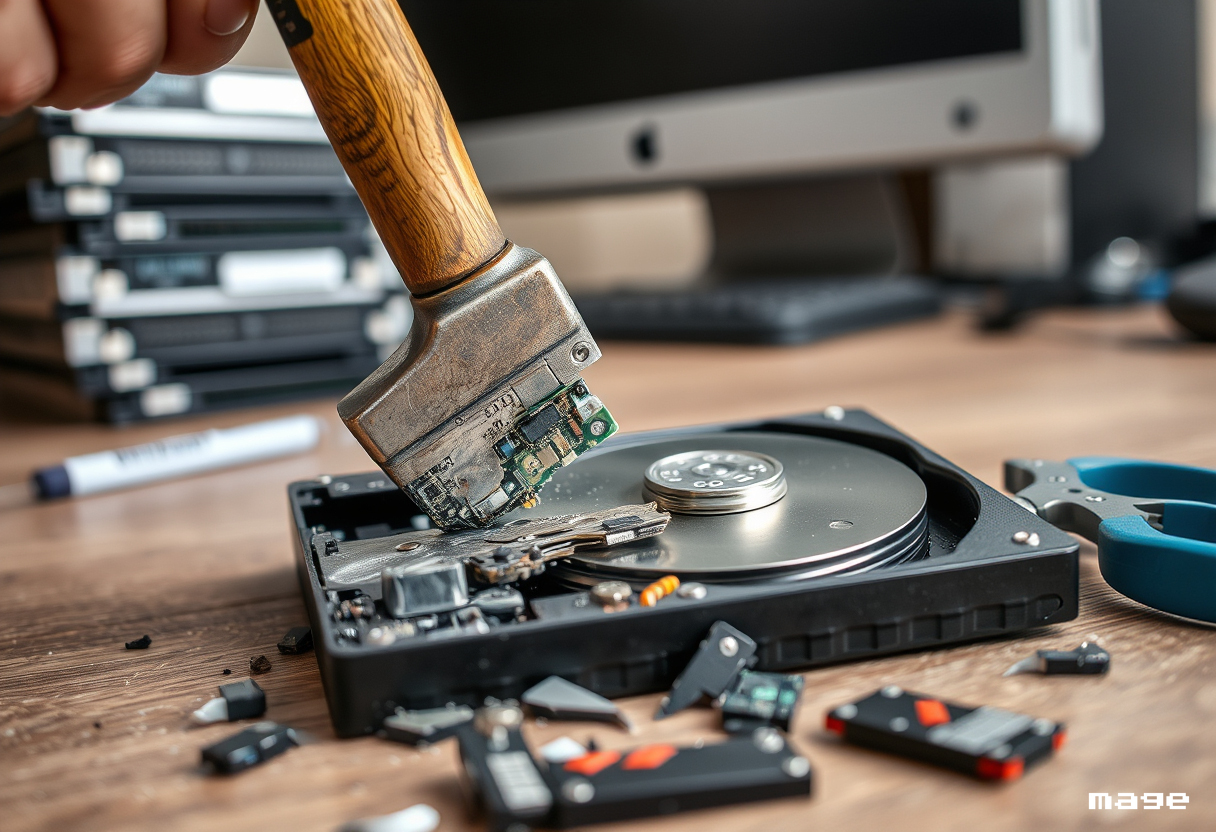In today’s digital age, the security of your data is paramount, making proper hard drive disposal more critical than ever.
Improper disposal can lead to serious risks, including data breaches and environmental harm.
While DIY destruction methods may seem like a quick fix, they often fall short in terms of safety and effectiveness.
This piece explores the importance of secure hard drive disposal, the downsides of DIY methods, and the benefits of choosing a professional shredding service.
Join us as we navigate these essential considerations for safeguarding your information and the environment.
The Importance of Proper Hard Drive Disposal
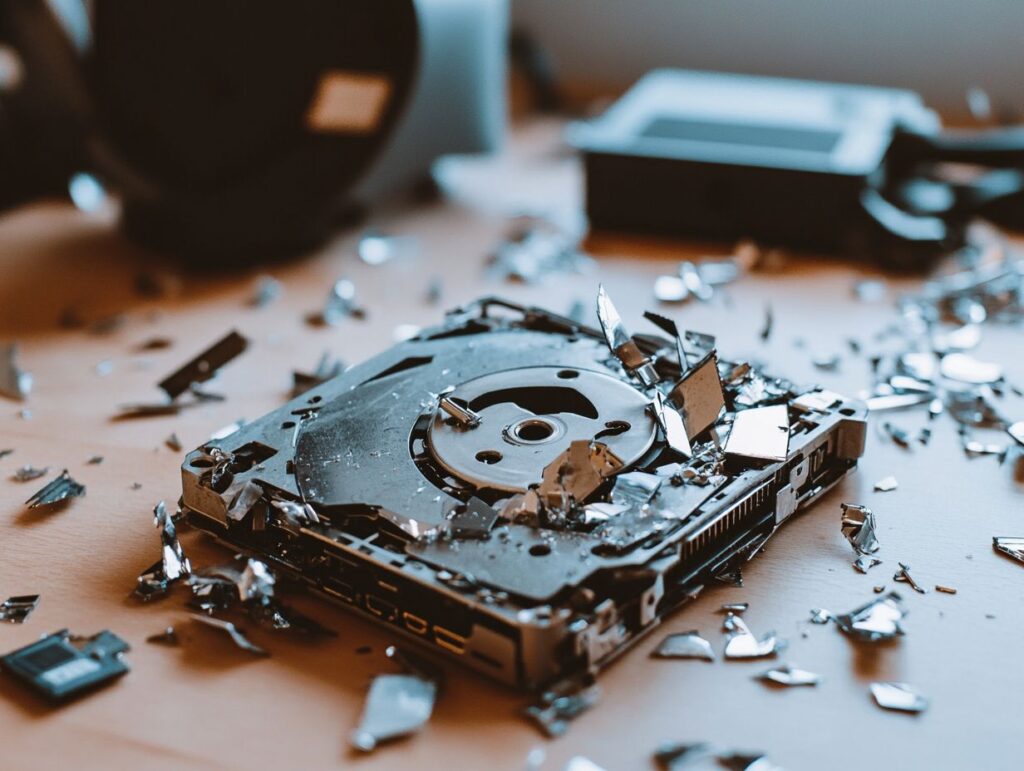
Proper hard drive disposal is essential for ensuring data security and safeguarding sensitive information from unauthorized access. Given the rising risks associated with data breaches and identity theft, both organizations and individuals must implement effective disposal practices to mitigate potential liability.
Additionally, improper disposal of electronic waste can lead to significant environmental consequences, highlighting the necessity of engaging in responsible disposal methods. By adhering to regulations and utilising certified shredding services, entities can protect both their digital privacy and the environment, thereby emphasizing the critical importance of secure disposal in today’s technology-driven landscape.
Risks of Improper Disposal
Improper disposal of hard drives presents significant risks, including data breaches and identity theft, which can have devastating consequences for both individuals and organisations. When hard drives are discarded without sufficient data sanitisation or physical destruction, sensitive information becomes accessible to unauthorised individuals, resulting in considerable liability and confidentiality concerns.
Additionally, operational risks may arise from non-compliance with data protection laws, underscoring the necessity for effective disposal strategies.
Neglecting secure data disposal practices not only heightens the likelihood of these issues but may also lead to financial penalties and reputational harm. Organisations must routinely evaluate their data disposal methods, implementing robust protocols to mitigate these risks.
By prioritising secure data disposal, entities can protect personal information, safeguard their clientele, and ensure compliance with regulatory requirements.
Maintaining vigilance regarding the complexities of data security is essential, as overlooking this aspect can expose one to severe repercussions in today’s digital landscape.
DIY Hard Drive Destruction Methods
Individuals often consider DIY hard drive destruction methods as a cost-saving measure; however, these approaches can present significant risks if not executed with care.
While techniques such as drilling holes or using hard drive shredders may appear straightforward, they can lead to incomplete data destruction, thereby allowing for potential data recovery. Additionally, the technological risks associated with improper DIY methods can result in physical hazards and inadequate security measures.
Consequently, seeking professional assistance is a more sensible option for ensuring comprehensive data protection.
Overview of Common DIY Techniques
Common do-it-yourself techniques for hard drive destruction include methods such as drilling, hammering, and using software for data erasure, with each method exhibiting varying effectiveness in safeguarding privacy. While physical destruction methods can be effective in rendering a hard drive unusable, they often present technological hazards that can compromise user safety if not executed with caution. Conversely, software-based data erasure may not provide the necessary level of security to prevent unauthorised access to sensitive information.
For example, drilling through a hard drive’s platters can effectively obliterate the data; however, it poses risks such as flying debris and potential exposure to hazardous materials. Similarly, hammering can achieve comparable results but introduces the risk of physical injury and may prove inefficient, particularly if the drive is not entirely destroyed. In contrast, reputable data erasure software can overwrite existing data multiple times, thereby enhancing security against retrieval.
It is essential for users to recognise that relying solely on software solutions may leave residual traces of data, especially if the procedures are not executed correctly. Therefore, a thorough assessment of the risks and benefits associated with each do-it-yourself method is imperative for ensuring effective data management and physical destruction.
Potential Risks of DIY Hard Drive Destruction
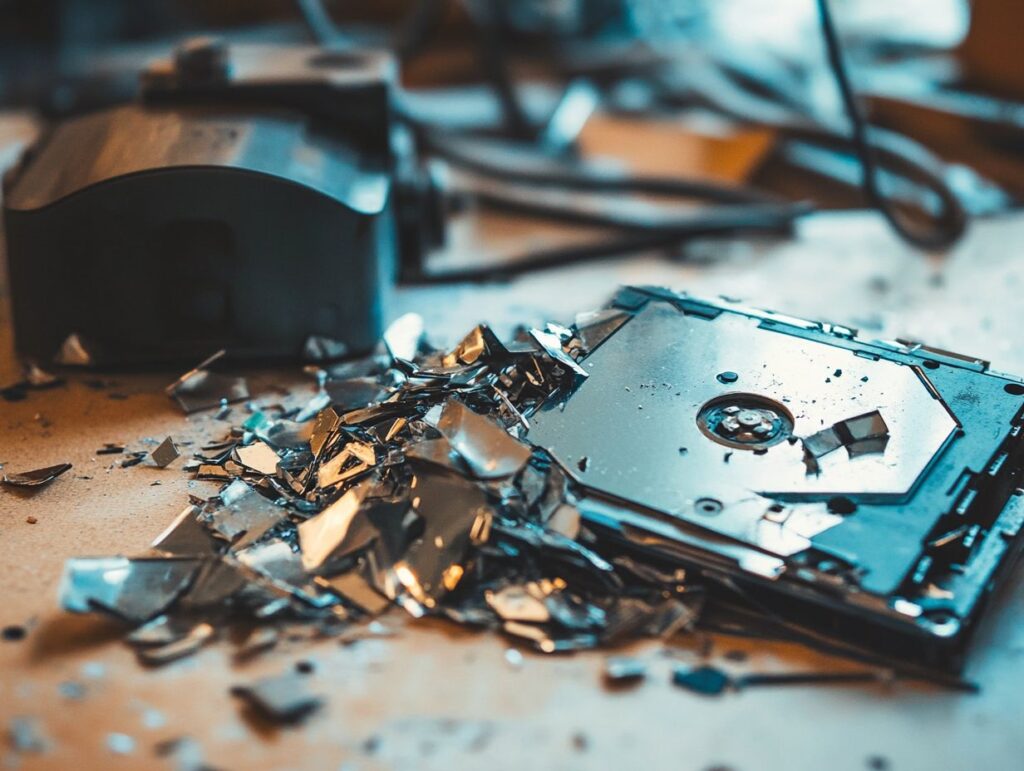
Although DIY hard drive destruction may appear to be a cost-effective solution, it poses significant risks that can jeopardise data security and lead to potential liability concerns.
Common pitfalls include insufficient data sanitisation, which may expose sensitive information to unauthorised access, as well as a failure to comply with environmental safety standards, resulting in improper disposal of electronic waste.
Furthermore, the operational risks associated with DIY methods can have lasting implications for both individuals and organisations. Therefore, engaging professional shredding services is a more dependable option for ensuring data security and compliance.
Data Security and Environmental Concerns
Data security and environmental concerns are fundamentally interconnected in the context of hard drive disposal, as improper disposal methods can compromise both aspects. Ensuring secure disposal practices not only safeguards sensitive information from unauthorized access but also adheres to compliance requirements associated with data protection laws and consumer protection regulations. The environmental ramifications of electronic waste highlight the necessity of employing responsible disposal solutions that effectively address these dual concerns.
When organisations neglect established protocols for hard drive disposal, they expose themselves to risks of data breaches that can lead to significant reputational damage, while also exacerbating the issue of e-waste pollution. Moreover, many businesses fail to recognise that data-holding devices contain hazardous materials that can leach into the environment, causing additional harm.
Adopting best practices in both data security and environmental stewardship not only fulfills legal obligations but also reflects a commitment to corporate responsibility. By partnering with certified e-waste recyclers and implementing shredding or degaussing techniques, organisations can alleviate compliance concerns while enhancing their sustainability initiatives.
Benefits of Professional Hard Drive Shredding
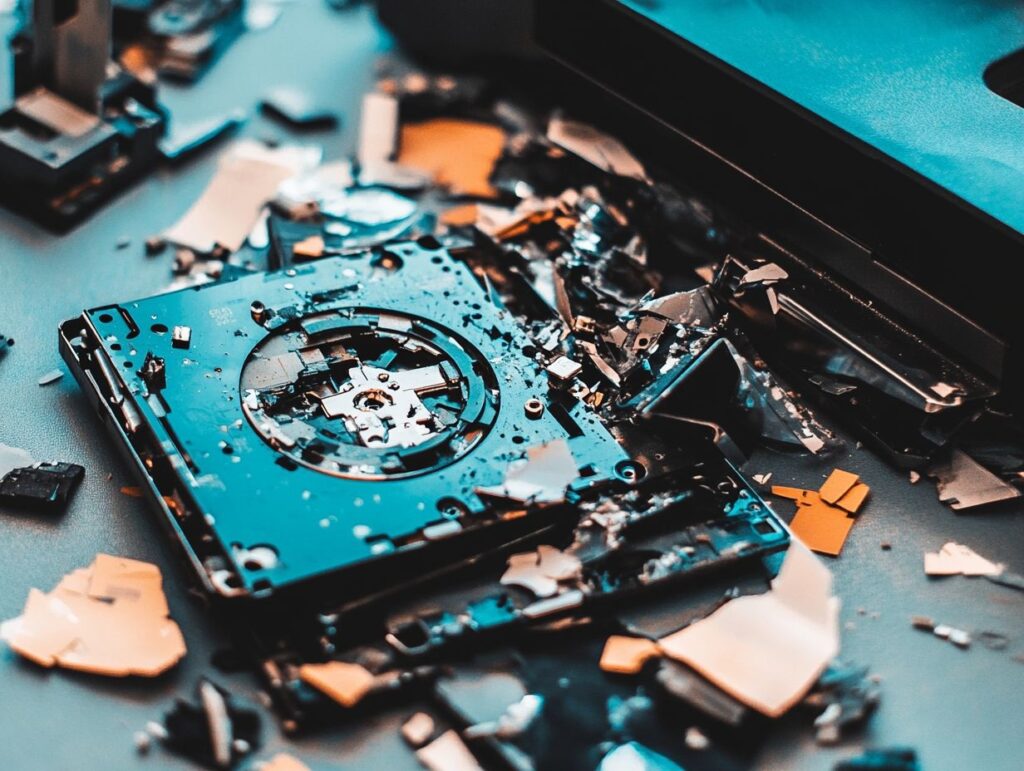
Professional hard drive shredding provides substantial advantages that greatly enhance data security and ensure compliance with data protection regulations. By employing certified shredding services, organisations can ensure the complete physical destruction of hard drives, thereby eliminating any possibility of data recovery and unauthorised access.
Furthermore, professional shredding practices align with environmental compliance standards, ensuring responsible disposal of electronic waste and promoting corporate responsibility and accountability in asset destruction practices.
Secure and Environmentally Responsible Disposal
The secure and environmentally responsible disposal of hard drives is a critical concern for organisations seeking to mitigate operational risks while ensuring data integrity. By utilising services that comply with shredding certifications and industry best practices, businesses can achieve both security and efficiency in their disposal processes.
This comprehensive approach not only strengthens the organisation against potential data breaches but also streamlines operational workflows, thereby minimising unnecessary downtime. Compliance with stringent industry regulations is essential, as it protects sensitive information and shields the organisation from substantial fines.
By implementing certified shredding methods and validated disposal practices, companies can establish a strong reputation while promoting eco-friendly initiatives. Consequently, this dual emphasis on security and ecological responsibility fosters stakeholder trust and enhances corporate image, ultimately benefiting the bottom line in an increasingly environmentally conscious market.
Choosing a Professional Shredding Service
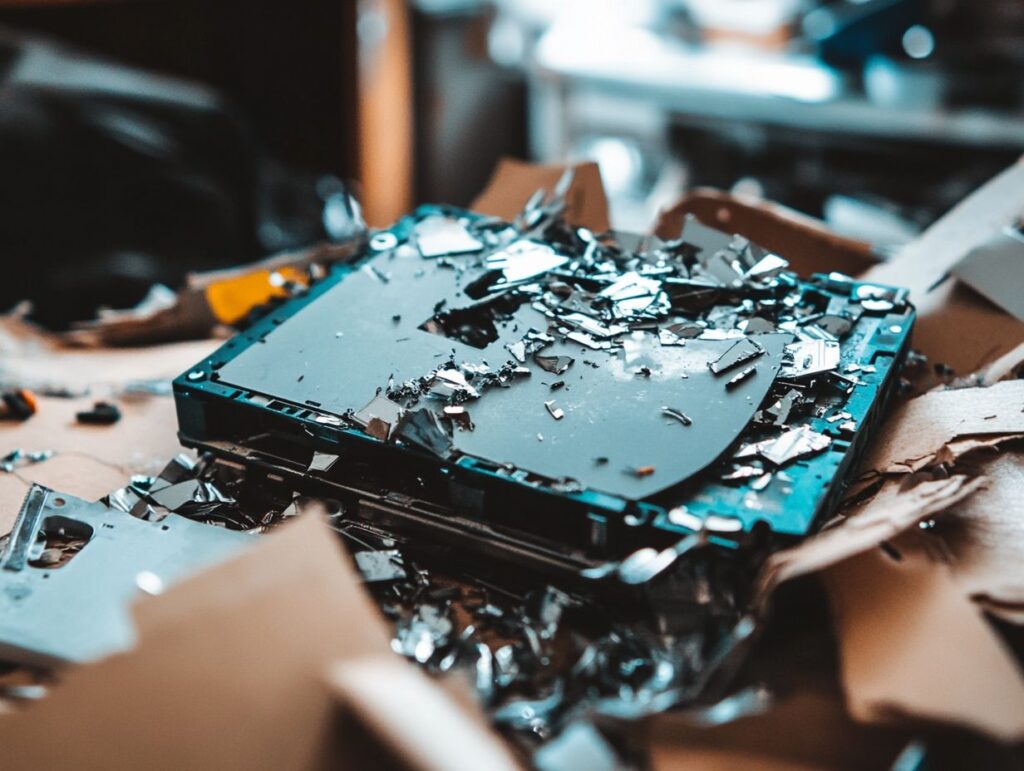
Selecting a professional shredding service requires careful evaluation of various factors to ensure both security and accountability in data destruction. Organisations should assess the range of shredding services provided, the quality of professional equipment utilised, and the vendor’s compliance with industry regulations and standards.
It is essential that the chosen provider effectively safeguards sensitive information and manages operational risks, thereby maintaining data integrity and ensuring compliance with data protection laws.
Factors to Consider
When selecting a shredding service provider, it is imperative to consider several critical factors, including their shredding policies, compliance with data protection laws, and operational efficiency. Organisations must ensure that the provider adheres to industry regulations and possesses the necessary certifications to guarantee secure data disposal.
Understanding the accountability measures implemented by the service provider is essential for mitigating operational risks and ensuring a reliable shredding process.
Additionally, the range of services offered, such as mobile shredding versus off-site options, should be taken into account, as these can significantly impact convenience and responsiveness. The provider’s reputation within the industry is equally important; organisations should seek customer reviews and testimonials to assess reliability and performance.
Furthermore, transparency in pricing structures and contractual terms is crucial in order to prevent unexpected costs and foster a trusting partnership. Ultimately, a comprehensive evaluation of all these aspects not only aids in compliance with stringent data protection laws but also enhances the overall operational efficiency of the organisation.
Frequently Asked Questions
What are the risks associated with DIY hard drive destruction?
DIY hard drive destruction carries various risks, including physical harm from dismantling the device, exposure to harmful substances like fumes and chemicals, and potential data breaches if the destruction is not done properly.
Why is professional shredding a safer option for hard drive destruction?
Professional shredding companies have specialised equipment and trained professionals who can safely destroy hard drives without the risk of physical harm or exposure to harmful substances. They also have strict protocols in place to ensure the complete destruction of data.
What types of equipment are used for professional hard drive shredding?
Professional shredding companies use industrial-grade shredders and crushers specifically designed for hard drives. These machines can completely destroy the hard drive, making it impossible to retrieve any data from it.
What measures are taken to ensure the security of hard drive destruction?
Professional shredding companies follow strict security protocols, including chain of custody procedures and video surveillance, to ensure the security and confidentiality of the hard drive destruction process. They also provide certificates of destruction as proof that the hard drive was properly destroyed.
Why is it important to properly destroy hard drives?
Hard drives contain sensitive and confidential data that can be accessed even after the device is no longer in use. Improper disposal of hard drives can lead to data breaches and put individuals and organisations at risk of identity theft, financial fraud, and other cyber crimes.
Can I ensure the complete destruction of data by physically destroying the hard drive myself?
While physically destroying a hard drive may seem like a feasible option, it does not guarantee the complete destruction of data. Professional shredding is a more reliable and secure method as it uses specialised equipment and techniques to ensure the permanent destruction of data on the hard drive.

